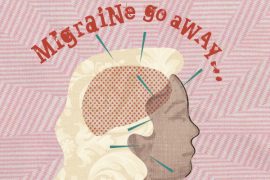By Emily McCluhan
Last fall, the FDA expanded the approved age to receive the HPV vaccine from 26 to 45 for both men and women. But how can a vaccine that prevents HPV be effective for adults given that the majority of adults are exposed to HPV as they become sexually active? To understand the reasoning, let’s look at the evolution of the vaccine, recommended screenings and the concerning trends of HPV-related cancers in the U.S.
HPV is one of the most common sexually transmitted infections in America and known to cause nearly all cervical cancer in women. It’s also linked to certain vulva, anal and penile cancers, and is tied to a rise in throat cancer in men, which now outnumbers cases of cervical cancer in women, accord- ing to the U.S. Centers for Disease Control and Prevention. These are facts that Dr. Diana Flint, a family medicine doctor with SSM Health, uses to encourage parents to vaccinate their children before they are exposed to the virus.
“We know the HPV vaccine is most efficacious in people who have not been exposed to HPV yet, and that’s why the recommendation is to get vaccinated between ages 11 or 12, [or even] as early as 9 years old,” says Flint.
She notes that in her time as a primary care provider, she’s seen parents become more open to the discussion and often ask about the vaccine.
“Initially the main concern parents had is that they are giving permission for their child to have sex, and that’s not at all the case. The fact is that we know exposure [to HPV] occurs at a very high rate,” Flint says. “It’s purely about prevention for when they do become sexually active.”
For kids who aren’t vaccinated in the recommended timeframe, there is a catch-up schedule for ages 15-26 that requires three shots instead of two. And since the vaccine was not available until 2006 and has evolved with a new version released in 2014 that covers nine strains of the virus, there is a large population of adults who are not vaccinated or could benefit from the newer vaccine. This led the FDA to increase the approved ages for the vaccine to include 27–45-year-olds.
“If you’re having new partners at any age, you always have an increased risk of new exposure to a different strain of HPV, even if you’ve been exposed to other strains before, so there may be a benefit there,” Flint says.
“But if you’re a person who’s been in a long term monogamous sexual partnership, then there may not be a need to get an HPV vaccine after the age of 27.”
Although some detractors of vaccines try to correlate serious risks with the HPV vaccine, the CDC continues to publish data about its safety and efficacy. From Flint’s perspective, the minor side effects that are common with most vaccines like injection site redness or pain, nausea and sometimes fainting outweigh the long-term benefits of prevention of potentially life-threatening cancers. She stresses the importance of having the discussion with your child’s provider, or your own if you aren’t vaccinated, and for women to continue getting screened for HPV with their PAP smears.
“It will take another 10-20 years to fully realize the impact of the vaccine, but we’re already seeing a decrease in the prevalence of HPV,” Flint says. “And that alone is worth it.”


